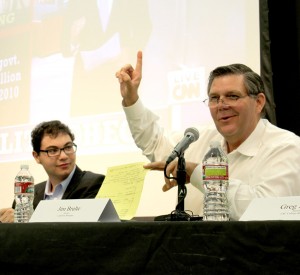Candidates clash in town hall debate
Students watched President Barack Obama and Republican presidential candidate Mitt Romney face off in the volatile second presidential debate Tuesday night at an event hosted by the USC Annenberg School for Communication and Journalism and sponsored by the Jesse M. Unruh Institute of Politics.

Analyze this · Panelists Max Schwartz (left), a member of the USC College Democrats, and Jim Brulte, former California State Senate and Assembly Republican Leader, discuss the debate. – Alec Faulkner | Daily Trojan
The debate aired live from Hofstra University in Hempstead, N.Y. Moderated by CNN Chief Political Correspondent Candy Crowley, the evening’s debate covered topics ranging from domestic policies to the attack in Libya.
Unlike the previous debates this election cycle, the second debate took the form of a town hall meeting in which citizens were able to pose questions to the presidential candidates on foreign and domestic issues. The audience was composed of undecided voters, 60 percent of whom did not approve of the current health of the economy.
Both Democratic and Republican voters anxiously anticipated the quality of performances by both candidates. Obama’s campaign promised a more energized and aggressive attack following his lackluster performance during the first debate.
The combative dialogue between Romney and Obama on the Republican candidate’s ties to big business was one hallmark of the difference in performance.
“And when I hear Governor Romney say he’s a big coal guy, I mean, keep in mind, when — Governor, when you were governor of Massachusetts, you stood in front of a coal plant and pointed at it and said, ‘This plant kills,’ and took great pride in shutting it down,” Obama said. “And now suddenly you’re a big champion of coal.”
Later, Romney volleyed back, attacking Obama’s term as president.
“I think you know better,” Romney said. “I think you know that these last four years haven’t been so good as the president just described and that you don’t feel like your confident that the next four years are going to be much better either.”
Based on the student audience’s responses, the candidates followed through on promises to be more engaged in this debate. To Austin Reagan, a freshman majoring in political science, Obama’s performance increased substantially from the first debate.
“I would be the first to admit that I thought Romney did very well in the first debate,” Reagan said. “But I’m also the first to admit that I thought he did really poorly this time.”
Despite Romney’s increased approval, which placed him in a dead heat with the President according to most polls, the panelists said they thought the President made a comeback.
The panel, which the Unruh Institute’s director Dan Schnur moderated after the debate, discussed the stark contrast between the performance of both candidates between the first and second debates.
Garry South, a senior democratic strategist and former senior advisor to California Governor Gray Davis, noted how Obama learned his lesson from the first debate.
“What happened tonight is that Barack Obama actually showed up,” South said. “A different Obama showed up.”
Jim Brulte, a former California State Senate and Assembly Republican Leader, agreed with his fellow panelists regarding Obama’s performance.
“Barack Obama reinvigorated his base,” said Brulte. “I thought where in the first debate where Mitt Romney had won, I thought it was relatively clear that Barack Obama won this debate.”
Not all attendees were as impressed with the President’s performance. Alexis Miller, a freshman majoring in interactive media, thought Obama performed better, but believed that both candidates could stand to improve.
“I felt like both candidates didn’t articulate very well, and there were a lot of pseudo-facts and flip-flopping,” Miller said. “That might just be a characteristic of politics.”
One of the main aspects that resonated with the panelists was the more aggressive nature of the night’s debate, particularly regarding the attacks in Libya.
To close the panel discussion, Schnur highlighted how the debates are ultimately watched to see the candidates perform unscripted.
“This is one of the rare occasions where you get to see the candidates unscripted,” said Schnur. “To see them under times of unanticipated questions and unanticipated circumstances.”
The Unruh Institute will host a screening of the third and final presidential debate on Monday at 6 p.m. in the USC Annenberg East Lobby.
